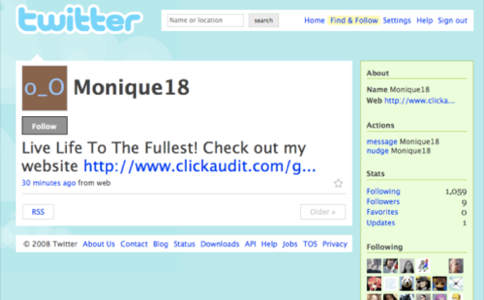According to a new report, over the past 12 months more than four-fifths of social networking site users said that they had received unwanted friend requests, messages, or posts on their social or professional network profile. While friend requests on their own seem innocuous enough, they are often just the first step towards whatever the spammers’ intended malicious activity is, be it redirects to phishing or malware sites or even just unsolicited advertisements.

The Spam Problem
Out of those surveyed, two-thirds of respondents said they would consider switching social networks if the spam level became too frequent. The companies running the social networks need to take note of that – if anything, spam messages were one of the contributing factors in many people’s decision to leave MySpace for Facebook. The amount of friend requests from people who weren’t real got to be out-of-hand on MySpace – turning down those bots’ requests became almost a daily chore.
But don’t think that just because you’ve left MySpace behind that you’re going to avoid the spam – it will just follow you to wherever you are. The report notes that over the past 12 months, respondents received an average of 64 unwanted friend requests, invites, or postings.
Image Courtesy of Facebook Talk

In fact, the security issues are the top reason why boomers (ages 40+) aren’t joining social networks. Out of those surveyed who did not use social networks, the number one reason (at 47%) involves privacy and concerns about having personal information accessible on the web. While those issues may speak more to the boomers’ mindset regarding how open you should be on the web with your personal information, the social network spam problem does nothing to help alleviate these non-participants’ concerns, either.
Spam on Twitter and FriendFeed
We recently uncovered what had appeared to be some of the first FriendFeed spam, but was actually a malfunctioning API client. But as both FriendFeed and Twitter and other, newer social sites continue to rank higher and higher in search results, the spam problem on those networks is only going to increase. Take for example, this search for the terms “tumblr full text rss” – the number one result is a link to the RWW Twitter profile thanks to a tweet that also contained those same terms. Do a search for “Scoble” and you’ll find Robert Scoble’s Twitter and FriendFeed profiles on the first page of results. And Alex has been seeing this Twitter spam since last night:

With strong SEO like this, it’s only a matter of time before we’re fighting off spammers in this newer social networks, too.
And don’t think it will always be easy to identify the spammers from rest either – those spammers can be crafty. Stop Twitter Spam notes that spammers are now scraping the public timeline to steal other people’s tweets and re-purpose them as their own. Case in point is Twitter spammer jennyvalley (account no longer exists), whose profile had tweets from several different languages! Of course, that may be a clue that she’s not legit, but it won’t be too long until spammers refine this process to make the bot seem more like a real person.
Image Courtesy of Stop Twitter Spam

Twitter has taken the time to clean up the spammers recently and so far, FriendFeed seems to be flying under the radar (unless you count this), but it’s only a matter of time before the spammers sign up there, too – especially once they realize the potential “Google juice” to be had.
To keep from getting spammed on your social sites, you must take precautions when on social networks – be careful who you friend and don’t reveal info that could be used to steal your identity. If you’re sending friend requests out for approval to people you don’t actually know – like on Facebook, for example – a quick note explaining who you are and why you want to friend them can be helpful to identify you as “safe to friend,” too.










